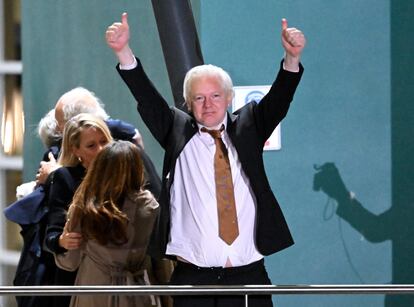US avoids cooperating on investigation into Spanish security company that spied on Assange
The country’s justice system is refusing to respond to judicial assistance requests until a New York court concludes whether the CIA participated in the events


The U.S. justice system will not cooperate with Spain’s Audiencia Nacional, a national high court, to clarify the espionage to which Julian Assange was subjected by a Spanish company during his stay at the Ecuadorian Embassy in London; at least not until a New York court concludes its investigation into the participation of the Central Intelligence Agency (CIA) in the events.
After four years without receiving a response to any of the judicial assistance requests sent to the U.S. by judges José de la Mata and Santiago Pedraz, who have been in charge of the case since 2019, U.S. authorities responded thus to an ultimatum received from Spanish investigators.
The prolonged silence had caused the General Subdirectorate of International Legal Cooperation, an agency that answers to the Ministry of Justice, to send U.S. authorities “an express pronouncement” on December 12 to know whether the judicial assistance in force between both countries was going to be denied.
María de las Heras García, Spain’s liaison magistrate in the United States, then announced the refusal by the American justice system to respond to requests for assistance until New York judge John G. Koeltl concludes his investigation into the alleged involvement of the CIA in spying on the founder of Wikileaks, as revealed by an EL PAÍS investigation.
The Department of Justice is unable to execute these requests at this time because doing so would interfere with the ongoing U.S. litigation, said the written response from Courtney E. Lee, an official in the Department of Justice’s Criminal Division. The first requests for judicial assistance were made several years before the filing of the aforementioned litigation, but they were not answered then either.
In August 2021, lawyers Margaret Ratner Kunstler and Deborah Hrbek, and journalists John Goetz and Charles Glass, both national security specialists, filed a lawsuit in New York against former CIA director Mike Pompeo and David Morales, a former Spanish military officer and owner of the Spanish company UC Global, SL, tasked with security at the Ecuador embassy in London while Assange was living there. The four plaintiffs were themselves the victims of spying when they visited Assange at the Ecuadorian Embassy in London, as were hundreds of others.
The lawsuit provided evidence revealed by this newspaper showing how numerous American citizens, as well as the lawyers and doctors of the Australian activist, were monitored and recorded by employees of the Spanish company. Their mobile phones were opened and their IMEI, the codes that identify each device, were photographed. Reports were drawn up on each visit and classified on the company’s central server in Jerez de la Frontera, in southern Spain.
CIA Director William J. Burns has used the National Security Act of 1947 and the Central Intelligence Agency Act of 1940 as a shield to avoid providing any information to the New York judge in charge of the case because it could cause “serious damage to the national security of the United States.”
The hurdles in the way of the Spanish investigation became evident from the beginning of the judicial investigation at the Audiencia Nacional, where a case was opened just a few weeks after EL PAÍS disclosed the CIA’s ties to the security company and the arrest of Morales. The first request for judicial assistance sent by Judge De la Mata, the first investigator in charge of the case, received a reply in September 2020, requesting to know “the sources of the facts” used for his investigations. The main sources are several protected witnesses who testified in court under that condition.
IP addresses and protected witnesses
De la Mata had also requested information about the IP addresses of the computers or other networked devices that allegedly connected from American soil to a server held by the private security firm UC Global at its headquarters in the southern Spanish city of Jerez de la Frontera. According to testimony by several ex-workers as well as e-mails used as evidence in the investigation, US intelligence services allegedly had access to this central server, which stored all the video and audio recordings captured by the cameras of the embassy where Assange was held for seven years. “Conclusive statements are not enough, we need real facts and the sources of the facts,” said the letter from U.S. federal prosecutors sent to De las Heras, the Spanish liaison judge.
Since then, silence has been the defining attitude of the U.S. Administration to the judicial assistance requests sent by the Spanish judge regarding statements by witnesses such as Pompeo or William Evanina, former head of Counterintelligence, or about the information gathered by the Senate Intelligence Committee that investigated the case, or statements by American victims of the spying, among other proceedings.
Assange, 52, was released on June 25 after signing a deal with the U.S. Justice Department in which he pleaded guilty to one count of violating the Espionage Act and accepted a five-year prison sentence, a duration of time that he had already spent behind bars at in London’s Belmarsh prison.
Sign up for our weekly newsletter to get more English-language news coverage from EL PAÍS USA Edition
Tu suscripción se está usando en otro dispositivo
¿Quieres añadir otro usuario a tu suscripción?
Si continúas leyendo en este dispositivo, no se podrá leer en el otro.
FlechaTu suscripción se está usando en otro dispositivo y solo puedes acceder a EL PAÍS desde un dispositivo a la vez.
Si quieres compartir tu cuenta, cambia tu suscripción a la modalidad Premium, así podrás añadir otro usuario. Cada uno accederá con su propia cuenta de email, lo que os permitirá personalizar vuestra experiencia en EL PAÍS.
¿Tienes una suscripción de empresa? Accede aquí para contratar más cuentas.
En el caso de no saber quién está usando tu cuenta, te recomendamos cambiar tu contraseña aquí.
Si decides continuar compartiendo tu cuenta, este mensaje se mostrará en tu dispositivo y en el de la otra persona que está usando tu cuenta de forma indefinida, afectando a tu experiencia de lectura. Puedes consultar aquí los términos y condiciones de la suscripción digital.








































